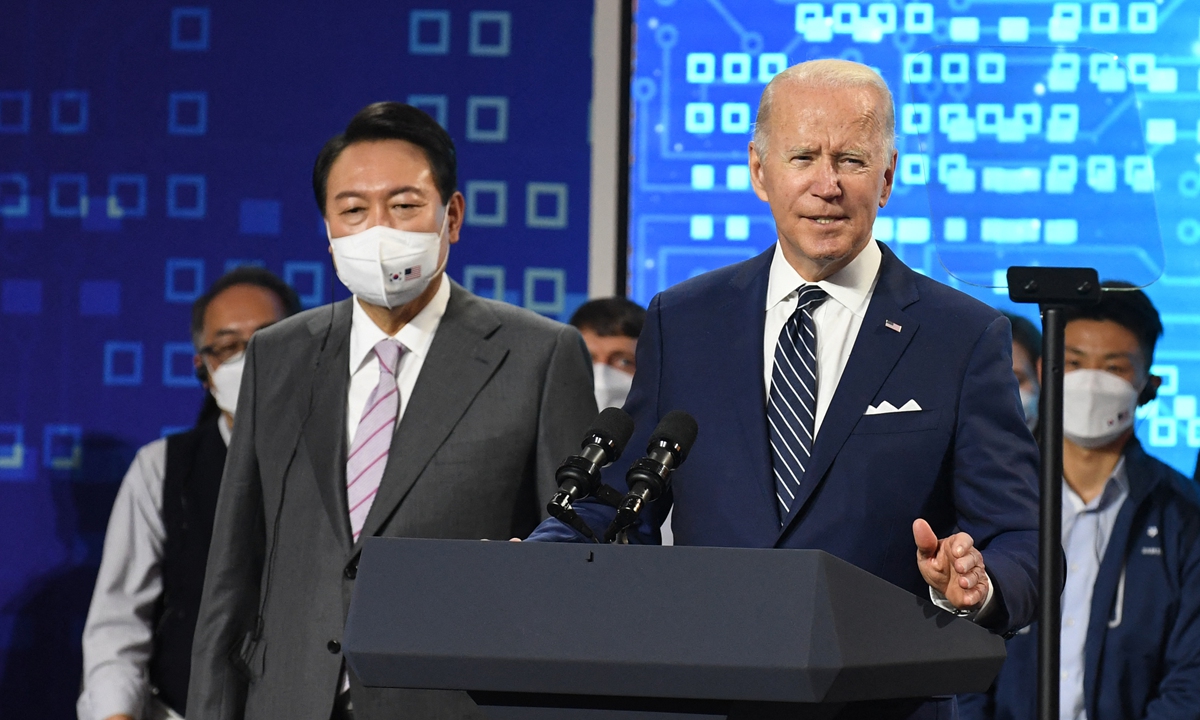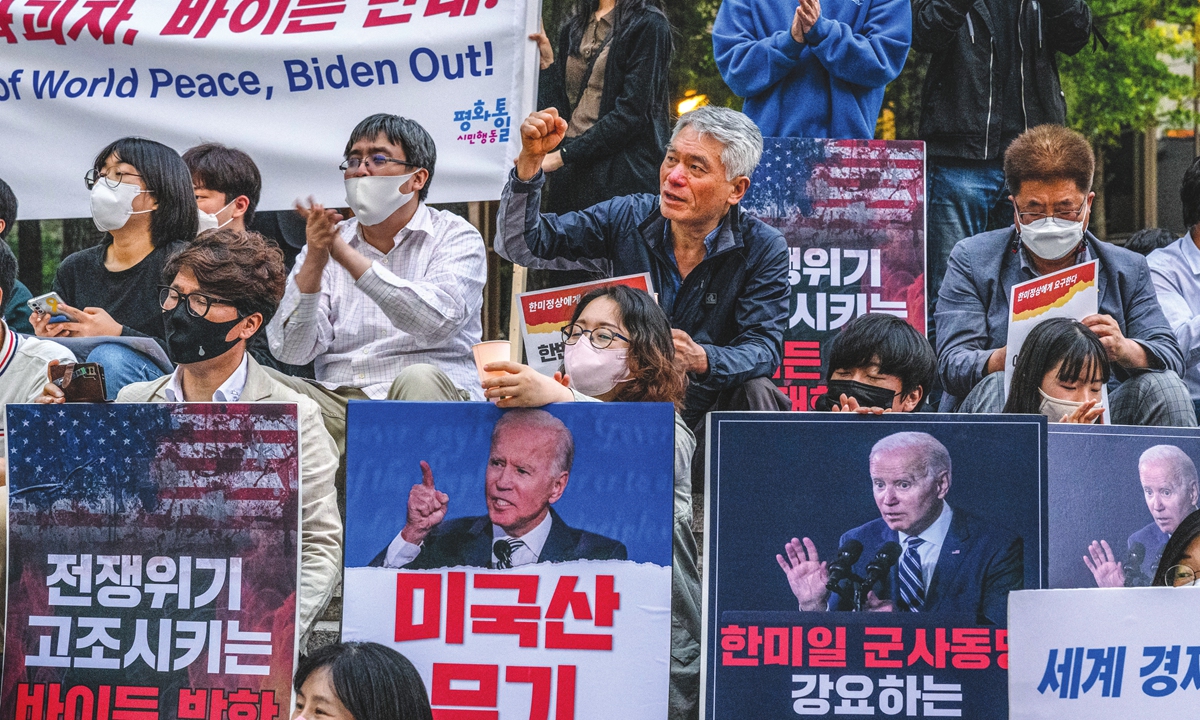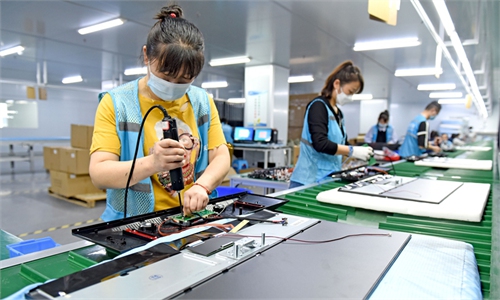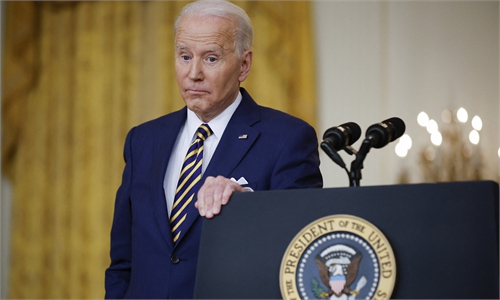Biden on mission to corner China visits Samsung on first leg of Asia trip, to be met with protests against ‘destroyer of world peace’

US President Joe Biden (right) speaks with South Kroean President Yoon Suk-youl during a press conference after visiting the Samsung Electronic Pyeongtaek Campus in Pyeongtaek, South Korea, on May 20, 2022. Photo: AFP
US President Joe Biden arrived in Seoul on Friday to kick off his first Asia trip and was scheduled to have the first summit with South Korean President Yoon Suk-yeol on a string of issues, and analysts said Biden may use the US-led Indo-Pacific economic framework and threats from North Korea as acting points to further pull South Korea closer. However, what benefits a geopolitical tool will bring to South Korea remains a question and many people alerted that standing unconditionally with the US will not maximize South Korea's interests.
According to Yonhap News, after Biden arrived, he and Yoon visited a Samsung chip plant in Pyeongtaek, "underscoring the two countries' commitment to working together to strengthen supply chains." On Saturday, Biden and Yoon will meet again to discuss the full range of security and economic challenges facing them and the region.
Biden's visit, which came 10 days after Yoon took his oath as South Korea's president, is the second time for a US president to visit South Korea ahead of the new South Korea president's visit to the US since 1993, and it's also rare to see US president make South Korea the first destination before Japan in an Asia trip. Some observers said such arrangements underscored Biden's scheme to pull South Korea into its strategies to contain China.
Even before Biden embarked on the Asia trip, the US and Japan had racked their brains to hype China topics. US National Security Adviser Jake Sullivan said Wednesday that Biden intends to seize the Asia trip - "this pivotal moment" - to assert "bold and confident American leadership" in the Indo-Pacific and send a message to China that the West and its Asian partners will not be divided and weakened. However, he also noted that the US wanted not so much to confront China on the trip.
In response to Biden's Asia trip and Sullivan's remarks, Chinese Foreign Ministry spokesperson Wang Wenbin said at a press conference on Friday that China hopes the US' actions will be in line with its remarks. He urges the US to work with regional countries for cooperation and not to collude for divisions or confrontations, or bring chaos or disturbance to the region.
Hyping threats
North Korea will be used as an acting point for the US to further pull South Korea closer, analysts said, as Yonhap News reported that topics on "the growing threat of North Korea's nuclear and missile programs" will top the agenda of the leaders' summit to bolster "combined defense and deterrence."
Chung Youngjune, a South Korean scholar who now works in Tongji University, told the Global Times that the Yoon government may discuss restoring joint military drills with the US, of which the scale shrank during the Moon government, and reactivate the Extended Deterrence Strategy and Consultation Group (EDSCG) over the permanent deployment of US strategic assets to South Korea on a rotational basis.
Chung said that as there are presumptions on North Korea's possible nuclear tests, the US and South Korea are very interested in strengthening military cooperation.
However, the main topics of the summit between South Korea and the US may still remain in economic security, not military security, as two countries want to improve cooperation in the supply chain of semiconductors and batteries, digital economy, setting technological standards, and clean energy, said Chung.
As one aspect of the US' Indo-Pacific Strategy, launching the Indo-Pacific Economic Framework is one of Biden's main missions. One pillar of the IPEF is a stable supply chain and this is why Biden made Samsung his first stop in South Korea, Da Zhigang, director of the Institute of Northeast Asian Studies at Heilongjiang Provincial Academy of Social Sciences, told the Global Times.
The IPEF, which was unveiled by Biden at the East Asia Summit last October to strengthen US economic cooperation with Indo-Pacific partners, is widely viewed as an anti-China coalition aimed at excluding China from global supply chains.
Samsung takes a large account of the global high-end chips and in November 2021, Samsung announced a site in Texas for its new $17 billion computer chip plant, amid a global shortage in semiconductors, which is the South Korean electronics giant's biggest US investment.
To push the US-proposed Chip Alliance into reality, discussions between governments are not enough and companies should also be involved. This is why Biden went to Samsung to have interactions. Moreover, how to contain China is the unspoken tune of Biden's trip and he may also send a message to Samsung to take back cooperating with China, Da said.
Since March, the US government has been touting a so-called Chips Alliance proposal to chip manufacturing powerhouses in the Asia-Pacific region - South Korea, Japan and the island of Taiwan - in an apparent attempt to kick the Chinese mainland out of the global chip supply chain.
However, South Korean media and analysts noted that the scheme is hard to realize as the Chinese market is too big to drop and it is also impossible to separate the supply chain and various trade and tariff issues.
Chung noted that the South Korean government has emphasized that to join the IPEF is not to go against China. "This is the stance South Korea took when it decided to join the Comprehensive and Progressive Agreement for Trans-Pacific Partnership (CPTPP) - not to go against the US."
Some experts noted that it is not surprising to see South Korea join the IPEF as it wants to decrease relying on the Chinese market and also attempts to replace China with the US on exports in certain fields. China has not opposed the IPEF but rejects a framework that targets a third party or undermines its interests.
They also noted that the benefits the IPEF will bring to South Korea remain a big question as the framework is more about geopolitics than economic cooperation. It seems no ally of the US has a good end except for being a pawn to serve US interests.
Biden's visit and recent actions in the Indo-Pacific region raised increasing concerns that South Korea may align with the US and abandon its previous balancing between China and the US.
Chung said that although China and South Korea have difference values, they share broader interests on supply chain and economic security. Many of South Korea's diplomatic policies are not targeting China, but made due to reasons of North Korea or pressure from the US.
South Korea has the manufacturing capability in high-tech and takes a valuable and excellent position on geopolitics in the US' strategic competition with China, Chung said. All these factors have made South Korea no reason to unconditionally stand with the US as relations with China are also important.
However, Chung also admitted that with the intensifying competition between China and the US and the escalating military rivalry between North Korea and South Korea, China-South Korea relations may encounter more problems.

Activists hold candles and placards as they protest against US President Joe Biden's visit to South Korea in Seoul on May 20, 2022. After a three-day visit to South Korea beginning on that day, Biden will travel to Tokyo. Photo: AFP
In facing possible damage to bilateral relations with China, the voice of calling South Korea to use Biden's visit to improve its own diplomatic independence either to China or the US has become louder in order to earn respect and interests. In facing the US' rampant pull, some people in South Korea called for vigilance.
For example, ahead of Biden's visit, some South Korean netizens posted their worries on social media, saying they don't welcome Biden if he came with the purpose to sacrifice South Korea's interests for its geopolitical purpose. One netizen noted the disturbance brought to the country after former president Lee Myung-bak attempted to pass the General Security of Military Information Agreement (GSOMIA) or Park Geun-hye's trying to deploy the Terminal High Altitude Area Defense (THAAD) missile system.
Some South Korean netizens are also worried that Biden's visit together with Yoon' government's tough attitude toward the North may create hurdles to relations with the North, pushing the hope for peaceful exchanges away.
According to Korea Times, on Friday, various protests were staged near the hotel on Mount Nam, where Biden is staying during his visit to Seoul. The demonstrators include a group of 40 supporters welcoming Biden's visit and about 60 protesters from two different groups who object to his presence here. Some protesters held banners, which called Biden the "destroyer of world peace."
Da also noted that the Russia-Ukraine conflict has changed some people's mentality in South Korea and made them weigh security over economic benefits. This also reminded China to take more effective measures to not only maintain smooth exchanges with the South Korea government, but also improve people-to-people exchanges while keeping good bilateral trade.



